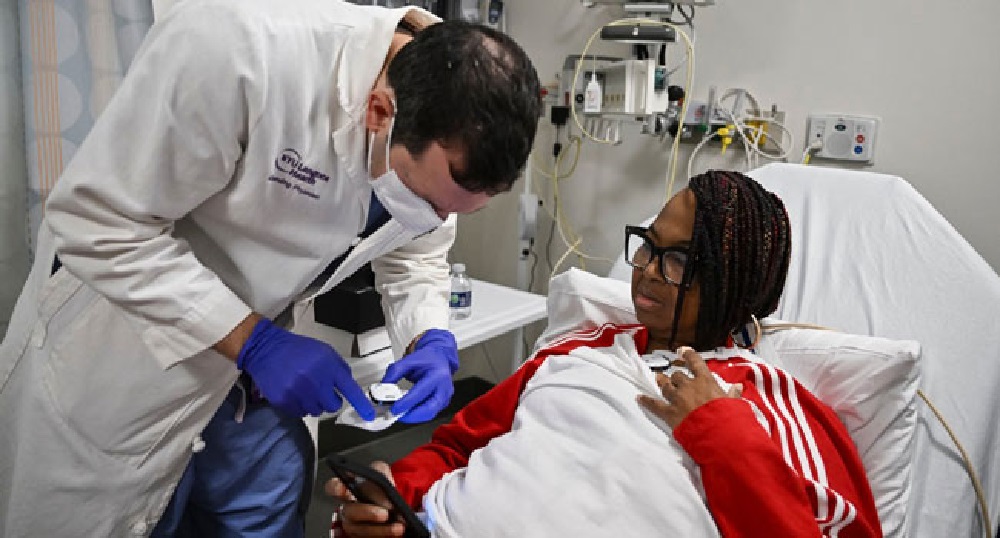Health
‘Blessed’: US Woman Sees Second Chance In Life After Pig Kidney Transplant

Towana Looney donated a kidney to her mother in 1999 only for the remaining one to fail years later due to pregnancy complications.
Now, the 53-year-old from Alabama has become the latest recipient of a gene-edited pig kidney — and is currently the only living person in the world with an animal organ transplant, New York’s NYU Langone hospital announced Tuesday.
“I’m overjoyed, I’m blessed to have received this gift, this second chance at life,” Looney said during a press conference, held three weeks after the procedure.
Xenotransplantation, transplanting organs from one species to another, has long been a tantalizing yet elusive scientific goal. Early experiments on primates faltered, but recent advances in gene editing and immune system management have brought the dream closer to reality.
Pigs have emerged as the ideal donors: they grow quickly, produce large litters and are already part of the human food supply.
Advocates hope this approach can help address the severe organ shortage in the United States, where more than 100,000 people are waiting for transplants, including over 90,000 in need of kidneys.
A last chance
Looney had been living with dialysis since December 2016 — eight grueling years. High blood pressure caused by preeclampsia had taken its toll, leaving her with chronic kidney disease.
Despite receiving priority on transplant waiting lists as a living donor, her search for a compatible kidney was a frustrating dead end. Her unusually high levels of harmful antibodies made rejection almost inevitable, and as her body lost viable blood vessels to support dialysis, her health declined.
Out of options, Looney applied to join a clinical trial for pig kidney transplants, and finally underwent the seven-hour surgery on November 25.
Asked how she felt afterward, Looney’s joy was infectious. “I’m full of energy, I’ve got an appetite… and of course, I can go to the bathroom. I haven’t been going in eight years!” she laughed, adding that she plans to celebrate at Disney World.
Jayme Locke, a surgeon on the transplant team, described the results with awe. “The kidney functioned essentially exactly like a kidney from a living donor,” she said, adding that Looney’s husband saw a rosiness in her cheeks for the first time in years.
“That is the miracle of transplantation.”
Cautious optimism
Looney’s surgery is the third time a gene-edited pig kidney has been transplanted into a human who is not brain dead.
Rick Slayman, the first recipient, died in May, two months after his procedure at Massachusetts General Hospital. The second, Lisa Pisano, initially showed signs of recovery following her surgery at NYU Langone, but the organ had to be removed after 47 days, and she passed away in July.
Looney, however, was not terminally ill before the transplant, noted Robert Montgomery, who led the surgery. Each case, he emphasized, provides critical lessons for refining the techniques.
The kidney was provided by biotech company Revivicor, which breeds genetically modified herds in Virginia. A Massachusetts-based company, eGenesis, provided the kidney for Slayman.
Looney’s organ has 10 genetic edits to improve compatibility with the human body — an advance over Revivicor’s earlier efforts that used kidneys with a single gene edit and included the pig’s thymus gland to help train the host’s immune system and prevent rejection.
Montgomery, a pioneer in the field who performed the world’s first gene-edited pig organ transplant in a brain-dead patient in 2021, said both methods are likely to enter clinical trials “probably by this time next year, or even sooner.”
“This is a watershed moment for the future of transplantation,” said Kevin Longino, CEO of the National Kidney Foundation. The nonprofit’s polling shows that patients and families favor faster clinical trial progress, believing the risk of inaction outweighs the uncertainties of xenotransplantation.
Looney was discharged December 6 to a nearby New York City apartment. Though her high antibody levels remain a concern, doctors are monitoring her closely using wearable technology and are trying a novel drug regimen to prevent rejection.
Periodic hospital visits may still be required, but the team remains optimistic she can return home in three months.
AFP
Health
Lassa fever claims 138 lives in 2025, cases spread to 18 states – NCDC

The Nigeria Centre for Disease Control and Prevention (NCDC) says Lassa fever has claimed 138 lives between January and now with a 19.3 per cent case fatality rate.
This was according to the NCDC latest situation report shared via its official website.
The report said the figure was a rise from the 18.0 per cent recorded within the same period in 2024.
The reports also said that a total of 717 confirmed cases had been recorded as of Epi Week 18, with four new states (Ondo, Edo, Bauchi, and Benue) reporting cases in the current week alone.
The public health agency said that while the number of new confirmed cases slightly decreased from 11 to 10 in the past week, the overall death toll remained alarming.
The report noted that 71 per cent of all confirmed cases originated from three states Ondo, 30 per cent, Bauchi, 25 per cent and Taraba, 16 per cent signaling persistent hotspots in spite of nationwide interventions.
It added that the most affected age group was 21–30 years, with the male gender appearing slightly more affected than the female with a male-to-female ratio of 1:0.8.
The agency, however, said that no healthcare worker was infected in the current week, though 22 healthcare workers have been affected so far this year.
The report disclosed that the NCDC had activated a multi-partner, multi-sectoral Incident Management System and deployed 10 Rapid Response Teams across affected states.
It said that the agency had also intensified contact tracing, community sensitisation, and distributed essential commodities like PPES, Ribavirin, body bags, and disinfectants.
This it said is in collaboration with international partners such as the WHO, MSF, CEPI, and Georgetown University.
The News Agency of Nigeria (NAN) reports that the country has conducted multiple webinars, capacity-building trainings, and surveillance activities to combat the outbreak.
However, the public health agency described that challenges to the responses were hampered by late presentation of cases, poor health-seeking behaviour, and low awareness levels in high-burden areas.
It also said that poor environmental sanitation contributed to disease spread.
The agency continues to urge Nigerians to maintain hygiene, report symptoms early, and avoid contact with rodents and their secretions.
”The public is also encouraged to follow NCDC advisories and utilise the toll-free line 6232 for inquiries,” it said.
The NAN reports that Lassa fever is a viral hemorrhagic disease transmitted primarily through contact with the urine or faeces of infected rats.
It can also spread from person to person through bodily fluids, contaminated objects, or infected medical equipment.
Symptoms include fever, sore throat, headache, vomiting, muscle pain, and in severe cases, bleeding from body openings.
Health
ANC: Why pregnant women with non-communicable diseases should register in teaching hospitals

By Francesca Hangeior
Maternal health experts have advised pregnant women with non-communicable diseases such as heart disease, hypertension, diabetes, and sickle cell disorder to register for antenatal care in teaching hospitals where they can get specialist care.
The gynaecologists noted that pregnancy among women with these health conditions was associated with high risk, especially during delivery, and therefore should be managed where there are specialists to avoid losing the baby or the mother or both.
The experts reiterated that pregnant women with those conditions needed to use tertiary hospitals for their ANC to reduce complications during and after birth.
A Consultant Obstetrician and Gynaecologist at the Nnamdi Azikiwe Teaching Hospital, Akwa, Anambra State, Dr. Stanley Egbogu, said pregnancy among women with co-morbidities comes with concern and lots of complications.
Egbogu said, “Women who have diseases like hypertension, diabetes, and heart disease before pregnancy must not use primary health centers for their antenatal care.
” It is important they register in a teaching or specialist hospital for their antenatal care because they need specialized care by experienced obstetricians and gynaecologists.
“If such women should visit PHCs for antenatal care, they should be referred to a teaching hospital immediately because they are prone to so many complications during pregnancy.”
The gynaecologist noted that people with hypertension could convulse during pregnancy.
“Those who have diabetes can have renal failure during pregnancy and delivery.
Those who have sickle cell disease can have anemia, and their blood can be so low that many of them have issues during delivery. For those who are asthmatic, pregnancy can worsen the asthmatic condition, and some of the drugs they use can affect the baby if not monitored.
“So, these women need specialised care and that cannot be offered at the primary healthcare level. The truth is that if those complications are not effectively managed, they could lead to the death of the woman or her baby”, he said.
Egbogu also advised the women to start antenatal care early and be regular at the antenatal clinic because “we want to see those that have problems more often than those that do not have problems.”
The Centres for Disease Control and Prevention says a woman with sickle cell disease is more likely to have problems during pregnancy that can affect her health and the health of the unborn baby than a woman without the disease.
During pregnancy, the disease can become more severe, and pain episodes can occur more often. A pregnant woman with SCD is at a higher risk of preterm labor, having a low birth weight baby, or other complications. However, with early prenatal care and careful monitoring throughout pregnancy, a woman with SCD can have a healthy pregnancy”, the CDC said.
According to the Asthma and Allergy Foundation of America, about 30 percent of all women with asthma report their asthma worsened while pregnant.
The foundation notes “Pregnant women with asthma may have a bit greater risk of delivering early. Or the infant may have a low birth weight. High blood pressure and a related condition known as pre-eclampsia are also more common in pregnant women with more severe asthma.”
Another maternal health expert and a Senior Registrar in the Obstetrics and Gynaecology Department at the Aminu Kano Teaching Hospital, Kano State, Dr. Mahmoud Magashi, says it is better and safer for pregnant women with co-morbidities to deliver in a specialist hospital to effectively manage associated risks both during and after delivery.
According to the World Health Organisation, in 2015, Nigeria’s estimated maternal mortality ratio was over 800 maternal deaths per 100,000 live births, with approximately 58,000 maternal deaths during that year.
But the Demographic and Health Survey 2018 showed that Nigeria’s latest maternal mortality ratio is 512 per 100,000 live births, which experts say is still very high.
Health
Psychiatrists link Nigerians’ declining happiness to economic hardship

By Francesca Hangeior
Psychiatrists have attributed Nigeria’s declining ranking in the World Happiness Report to worsening economic hardship, insecurity and political instability.
They warned that the rising cost of living and social instability was increasing anxiety, depression, and suicide rates among Nigerians, predicting a reduction in the country’s life expectancy rate.
The mental health experts who was speaking in an interview said that the inability of many citizens to afford necessities such as food, healthcare, and social interactions has significantly reduced happiness levels.
They noted that financial stress has prevented people from engaging in social activities that previously served as coping mechanisms, further worsening their emotional and mental well-being.
The experts urged the government to reverse the harsh economic situation and encouraged individuals to assist those in need and keep the hope alive.
On Thursday, March 20, the world marked the International Day of Happiness.
The Global Happiness Report released on Thursday by the Global Happiness Council ranked Nigeria 105th out of 147 countries.
The report evaluates happiness levels based on individuals’ assessments of their lives.
This year’s report showed that Nigeria, which used to rank the happiest African nation, now ranks 10th, dropping three steps from its usual position.
In 2003, the New Scientist magazine in the United Kingdom named Nigeria the happiest country in the world out of 65 countries surveyed.
In 2010, the Gallop World Poll also ranked Nigeria the happiest place on earth out of 53 countries surveyed.
Gradually, Nigeria’s rank began to drop as the years went by.
For example, before 2021, the World Happiness Report ranked Nigeria the sixth happiest country out of 155 countries.
But in 2024, the WHR placed Nigeria as the 102nd happiest nation out of 143 countries.
Speaking on the health and mental implications of the 2025 WHR, the President of the Association of Psychiatrists in Nigeria, Professor Taiwo Obindo, stated that the sad economic and socioeconomic realities of the country, insecurity situation and political difficulties were factors dwindling the happiness levels of many citizens.
He added that the lack of happiness could increase anxiety and depression levels, consequently causing a rise in death by suicide.
The don further noted that unhappy people were less likely to give their best at work or at home, leading to reduced economic output and a negative impact on the future of children in the country.
“The first question we need to ask ourselves is, what has driven us back, and then why we are where we are? What are the implications, is it the way and the manner in which things are going in the country? We are largely, generally, having difficulties economically, in terms of security, even politically. Things happening around us are not cheering.
“So, one won’t be too surprised that the cost of living is so high, the standard of living is so low, that people cannot afford to live a decent life,” Obindo said.
The APN president further stated that measures that previously helped Nigerians to socialise and be cheerful have become unaffordable, stating that these contributed to a drop in the country’s WHR.
The psychiatrist stated that a rise in unhappiness would lead to higher depression rates, which could, in turn, contribute to an increase in physical illnesses like high blood pressure.
“It affects virtually all parts of our body, all parts of our systems. And of course, those who are using one medication to control their blood pressure may need to do more. Of course, one of the things that I didn’t mention is that the costs of drugs have multiplied and a lot of people are not able to afford to buy some of the drugs for their medication. Therefore, situations are becoming more and more complicated.
“So, in all this, somebody who has hypertension and doesn’t have good control of it and needs more medication, because they cannot afford, may develop a stroke, may have a heart attack, and therefore, their life is cut short,” the don said.
The APN president further noted that the situation would reduce the life expectancy rate of Nigerians.
He warned, “It’s a vicious cycle and we need to have this reversed soon enough for people to go back to living their happy and their social life.”
Obindo urged the government to intervene and reverse the harsh economic situation to make life easy for Nigerians, stating that the high cost of things was becoming unbearable.
“At the community level, we must be our brother’s keeper. There are those who are more well-to-do, they must reach out, particularly in this particular season of fasting and lent. We must set up a good way of reaching out to people and the true less privileged around us.
“We must find a way of increasing job opportunities and making sure that the cost of living is reduced. We need to reverse the trend of pharmaceutical companies leaving the country.
“On the individual and family level, we must make sure that we don’t allow this situation to overwhelm us. We should make sure that we don’t allow our joy to disappear and be taken away by the situations around us. There is hope. Hope is what keeps us going. Things may not be as we expected now, but if we look and hope for a better tomorrow, that keeps us going,” the psychiatrist advised.
Also, a Consultant Psychiatrist, Dr Samuel Aladejare, emphasised the importance of happiness, explaining that when people are happy, the brain releases dopamine, a hormone that boosts motivation.
He noted that when dopamine was not released, it meant that there was sadness, adding that when sadness got to an extent, it led to depression, death by suicide and poor mental health outcomes.
The psychiatrist further stated that the inability to conveniently meet basic needs such as food, shelter and social connections has contributed to Nigeria’s declining WHR.
Aladejare also highlighted factors such as rising food prices, insecurity, kidnappings, and brutality from security agents, adding that the increasing migration rate has further impacted the social well-being of Nigerians.
The psychiatrist noted that countries that have maintained a top rank for a long time had robust social packages for their people, describing them as “one of the most secure countries in the world.”
He further noted that unhappiness could cause an inability to sleep, anxiety, and depression, leading to high blood pressure or worsening present health conditions.
Aladejare added that it could cause less concentration at work, leading to avoidable mistakes and frustration.
The mental health experts noted the inability of persons living with certain health conditions to afford their medications and treatment, would lead to poorer health outcomes and avoidable deaths.
Aladejare advised, “It would be good for Nigerians, now that we have this kind of situation, to prioritise their health. Prevention should rank high in everybody’s priorities and three measures are very important for preventing whatever illness it is, exercise, good sleep and proper diet. Those three things would save us a lot of issues.
“Yes, things are difficult but you can decide that whatever happens, you make time for exercise. 30 minutes in the morning or night or of more daily serious activities. Also, eating healthy. I know that has also become very difficult but try doing the least that we can do to make that happen. Despite how difficult it is, get adequate rest.”
He advised persons with non-communicable illnesses to adhere to their drug regimen to prevent further complications that required expensive interventions.
The mental health expert also advised avoiding negative news or social media posts and encouraged the use of good music to lighten the mood regardless of the situation.
-

 News14 hours ago
News14 hours agoAlleged cyber bullying: IGP re-arraigns VDM
-

 Opinion19 hours ago
Opinion19 hours agoHuman Capital Devt: The Rep Paul Nnamchi
-

 News16 hours ago
News16 hours agoBREAKING: PDP, NNPP Rep members abandon parties, lace boots with APC
-

 News19 hours ago
News19 hours agoSEE Current Black Market Dollar (USD) To Naira (NGN) Exchange Rate
-

 News19 hours ago
News19 hours agoNnamdi Kanu’s family wants court to ban NAN coverage of son’s trial or allow live streaming
-

 News13 hours ago
News13 hours agoBill To Make Voting Compulsory For Nigerians Passes Second Reading
-

 News19 hours ago
News19 hours agoPDP Summons Emergency Meeting As South-East Threatens Exodus
-

 News18 hours ago
News18 hours agoAlleged scam: Coalition wants EFCC to charge ex-Chairman, Bawa to court immediately


















